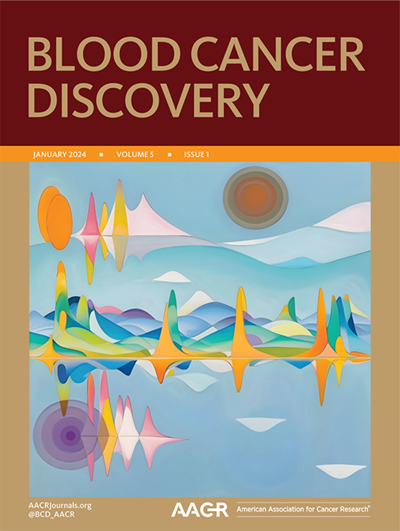AML的免疫靶点。
IF 11.5
Q1 HEMATOLOGY
引用次数: 0
摘要
摘要:在本期《癌症发现》杂志上,Nelde及其同事使用了一种基于灵敏质谱的免疫肽组学方法来表征急性髓细胞白血病(AML)的抗原性,并能够识别白血病干细胞(LSC)和大量原发性AML母细胞所呈现的免疫原性肽。这些免疫原性肽主要引发CD4 T细胞反应,HLA II类免疫肽的多样性和CD4记忆性T细胞反应的存在都与临床结果的改善有关。见Nelde等人的相关文章,第468(1)页。本文章由计算机程序翻译,如有差异,请以英文原文为准。
Immunologic Targets in AML.
Summary: In this issue of Blood Cancer Discovery, Nelde and colleagues used a sensitive mass spectrometry-based immunopeptidomics approach to characterize the antigenic landscape of acute myeloid leukemia (AML) and were able to identify immunogenic peptides presented by both leukemia stem cells (LSC) and bulk primary AML blasts. These immunogenic peptides elicit primarily CD4 T-cell responses and the diversity of the HLA class II immunopeptidome and presence of CD4 memory T-cell responses were both associated with improved clinical outcome. See related article by Nelde et al., p. 468 (1) .
求助全文
通过发布文献求助,成功后即可免费获取论文全文。
去求助
来源期刊

Blood Cancer Discovery
Multiple-
CiteScore
12.70
自引率
1.80%
发文量
139
期刊介绍:
The journal Blood Cancer Discovery publishes high-quality Research Articles and Briefs that focus on major advances in basic, translational, and clinical research of leukemia, lymphoma, myeloma, and associated diseases. The topics covered include molecular and cellular features of pathogenesis, therapy response and relapse, transcriptional circuits, stem cells, differentiation, microenvironment, metabolism, immunity, mutagenesis, and clonal evolution. These subjects are investigated in both animal disease models and high-dimensional clinical data landscapes.
The journal also welcomes submissions on new pharmacological, biological, and living cell therapies, as well as new diagnostic tools. They are interested in prognostic, diagnostic, and pharmacodynamic biomarkers, and computational and machine learning approaches to personalized medicine. The scope of submissions ranges from preclinical proof of concept to clinical trials and real-world evidence.
Blood Cancer Discovery serves as a forum for diverse ideas that shape future research directions in hematooncology. In addition to Research Articles and Briefs, the journal also publishes Reviews, Perspectives, and Commentaries on topics of broad interest in the field.
 求助内容:
求助内容: 应助结果提醒方式:
应助结果提醒方式:


